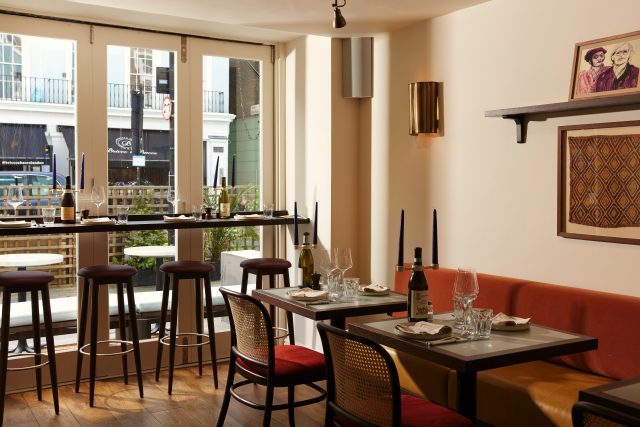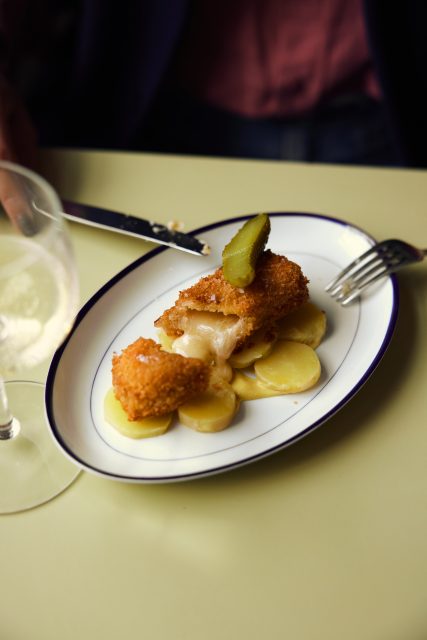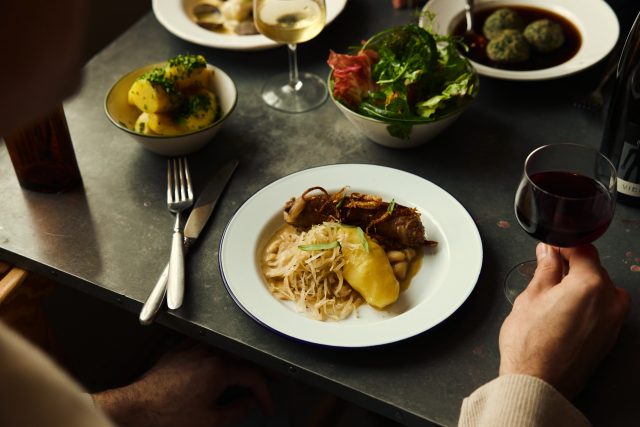This website uses cookies so that we can provide you with the best user experience possible. Cookie information is stored in your browser and performs functions such as recognising you when you return to our website and helping our team to understand which sections of the website you find most interesting and useful.
What to drink at Fitzrovia’s July
From dry Gewurtztraminer to “savoury” Riesling, Louis Thomas learns about the Alsatian-focused offering of the new Fitzrovia opening.

Solynka Dumas, co-founder of July on Charlotte Street, told the drinks business of her feeling that Alsace is indeed an “underrated” wine region: “Historically it shifted between various cultures and traditions and it therefore had to craft its own identity. As a wine region that was incredibly popular back in the days, it fell out of fashion in the last 20 years but that didn’t stop wine makers from continuing to do what they do, remaining dynamic and experimental by building on traditions, but not resting on them.”
“A third of the grapes in Alsace are grown organically,” Dumas continued. “The winemakers we work with at July mostly come from families of winemakers or have been making wines for many years, yet their wines are incredibly zeitgeisty. That ancestral knowledge also gives wines of an extreme elegance and complexity. Pinot Noir from Alsace really has nothing to envy about Burgundy, and comes at a much kinder price.”
The list was created in partnership with sommelier Honey Spencer, co-founder of Sune in Hackney.

Picking some of her personal favourites from it, Dumas cited one winemaker in particular: “Anaïs Fanti is a fabulous wine maker, who comes from a family of wine makers but was working as a nurse until she decided to go to Georgia to work in vineyards and later moved back to Alsace to produce her wines. Her wines are not quite anything I’ve ever tried like before, incredibly alive with a lot of grace. At July we carry two of her wines, Habibi Cheri (£90 for a bottle), which is a Gewurtztraminer amber wine, and Pampa Rossa (£95 for a bottle), a gorgeous Pinot Noir at the border between red and rosé.”
“Otherwise,” she continued, “I would probably say Dorfschatz, our dry Gewurtztraminer from Soil Therapy. It is surprising as its quite unusual to find a dry, non-amber Gewurz, It’s a wine that is incredibly floral and aromatic, with a rare elegance.”
While this most Germanic part of France is at the heart of July, other wine regions do feature on the list too.
“Our wine list outside of the Alsace is actually quite versatile with two criteria, we only carry European wines (focusing mostly on cool climate regions) and the wines need to be low-intervention,” Dumas shared. “At July we wanted to show that its possible to drink wines that are made in a way that aligns with our values but that are still elegant and well balanced. Spencer has coined a perfect term for it: ‘Natural wine for grown-ups’.”
“Other than that, the wine list is very personal, the regions most represented are either places we have lived, like Switzerland, Austria, Piemonte, Germany, or regions we love, like Champagne. We actually have every region of Champagne represented at the restaurant.”
Among the Champagnes on the list is Mouzon Leroux & Fils’ NV Grand Cru L’Ascendant (£180 for a bottle), and Aurélien Suenen’s 2019 Grand Cru Oiry from the Côte des Blancs (£245 for a bottle).
However, while regions from outside of Alsace do crop up, this eastern slither of France is very much July’s bread and beurre.
“I think that down the line, we would like even more wines from the Alsace to feature on our list. We will keep the wine list flexible but the skeleton will remain quite similar. There will always be some changes here and there, some add ons, but no drastic turn around.”
The by-the-glass selection is similarly Alsace-focused: “We try to have a wine for everyone in the by the glass offering, with always an option to pick at least one Alsatian wine in each category of white, red, amber or bubbles. We have about three bubbles by the glass (two from Alsace), five whites (two from Alsace), one rose, one amber (from Alsace) and four reds (including a 2015 Pinot Noir from Chrisitian Binner) and three dessert wines (one from Alsace).”
Beyond wine
Although there is a certain Eric Cantona-backed lager that has a connection to Alsace and it’s noble hop farmers, it does not feature in July’s drinks offering.
“We desperately tried to find an Alsatian beer in London but we couldn’t find any that was aligned with our ethos on craftsmanship and sustainability. We therefore had to fall back on Rothaus, a wonderful pils from the black forest in Germany.”
“Regarding our spirits,” Dumas revealed, “we offer a selection of cocktails curated by the wonderful Marcis Dzelzainis. Our guideline to him where that we wanted cocktails that used grape-based liquor as their base alcohol. We wanted the offering to be unique but not pretentious, with delicious and accessible cocktails made with high-quality produce that demonstrate great craftsmanship.”
Pairing picks

Asked to select the bottles and dishes that she would pick for a meal at July, Dumas suggested opening with Jomeyer’s Chante Pinot (£15 for a glass, £80 for a bottle) for the aperitif: “It’s a family that has been making wines for five generations – the wines are currently made by two sisters and are the perfect harmony between tradition and modernity. The Chante Pinot is, for me, a perfect representation of what one would expect from a Crémant d’Alsace while still being surprising by its singularity.”
Moving onto the mains, Dumas picked Domaine Bohn Lieu-dit Schieferberg Chapelle Oberhagel 2019 Riesling (£17 for a glass, £99 for a bottle): “It’s incredibly savoury and complex with an incisive minerality. A true food wine that pairs beautifully with our homemade sausage dish, which is currently accompanied by sauerkraut, potato salad and a mustard sauce.”
Concluding with dessert, she was torn as to what to pick.
“Although I adore our Muscat from Domaine Binner (£13 for a glass, £87 for a half bottle), I will have to pick our Jurançon Moelleux Mon Plaisir from Domaine de Souche (£9 for a glass, £85 for a bottle), primarily because I love the domaine. I first discovered them via their Jurançon Sec and made my way to their Moelleux. The balance between the razor-sharp acidity and the sweetness of the wine is truly beautiful. Best paired with our cheese plate.”
Related reading:

